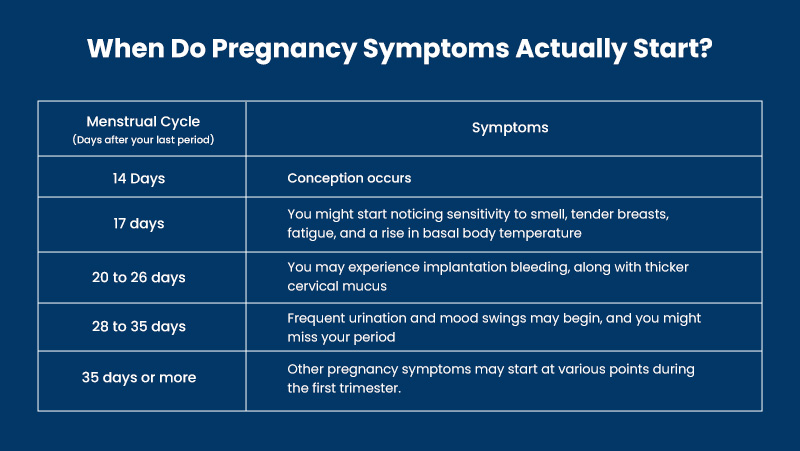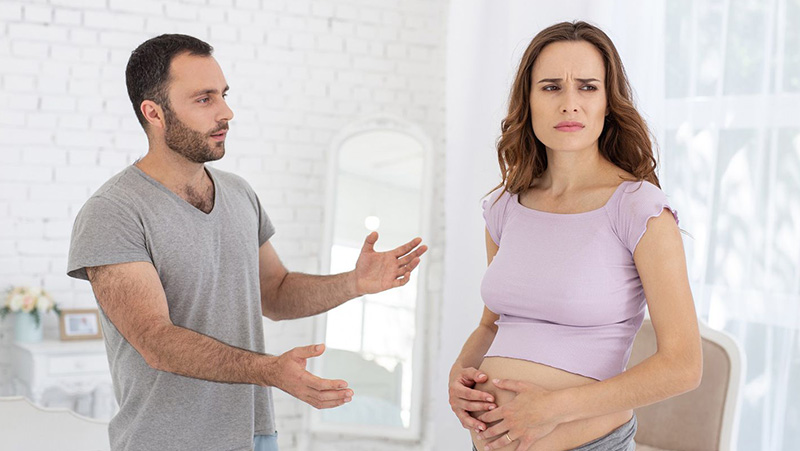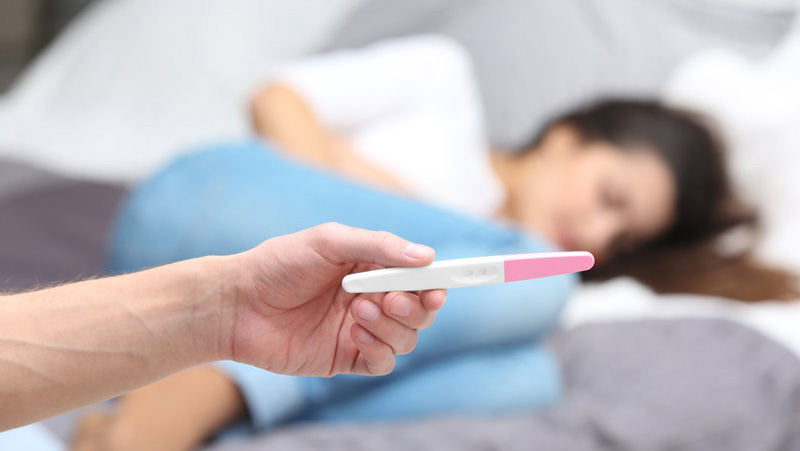If you're thinking about having a baby and have already stopped taking birth control pills, you might be eagerly looking for some early signs to indicate the same. Sometimes, women who are trying to get pregnant get confused because they experience symptoms and can't tell if it's just PMS or if they're expecting a baby.
Before using a home pregnancy test, your body might give you hints of early pregnancy, like being more sensitive to smells, changes in your breasts, and feeling more tired. But because these signs can be similar to what happens before your period, it can be a little confusing to figure out.
The only sure way to know if you're pregnant is by taking a pregnancy test (then confirming with a doctor). However, these early signs, some of which might happen before your period is due, could give you some clues that a little one might be on the way.
When Do Pregnancy Symptoms Actually Start?
Pregnancy symptoms generally show up at different times for different women. Some women might experience various symptoms at the same time, while others may not have any until several weeks into their pregnancies.
Following is the basic timeline of average pregnancy symptoms, considering a typical 28-day menstrual cycle—

Early Signs of Pregnancy Before You Missed Your Period
The obvious and easiest way to find out whether or not you are expecting is through a pregnancy test. However, there are a few early signs of pregnancy that might indicate the possibility even before you miss your periods.
Here's what you can look out for—
1. Sensitive Sense of Smell
If your sense of smell becomes stronger and things or smells that didn't bother you before now seem unbearable and unpleasant, it could be a sign of early pregnancy. Many women mention this as one of the first things they notice when they're pregnant, so if your nose is more sensitive than usual, it might be that you are going to become a mom very soon.
2. Rise in Body Temperature
If you've been checking your morning temperature regularly, you might see it go up by about 1 degree when you get pregnant, and it seems to stay higher when pregnant. It's not a guaranteed sign that you're pregnant as other things can make your temperature rise too, but it could give you a hint about the exciting news.
3. Fatigue
Pregnancy is like climbing a big mountain without any practice, and each day, your backpack that you are carrying gets a bit heavier and heavier. In simpler terms, it is a challenging path to walk, which is why feeling tired is one of the early signs many expecting moms go through.
When you become pregnant, your body uses a lot of energy to create a space for your baby to grow, called the placenta. All that hard work of your body can make you feel extra tired right after you conceive.
4. Mood Swings

Those hormonal changes during pregnancy are the ones to blame for the mood swings you might be going through. As early as 4 weeks into pregnancy, you could feel a little moody, like you do while PMSing. Later in the first trimester and throughout your pregnancy, you might be happy one moment and worried the next.
Apart from these various hormonal changes, your life is about to take lots of different turns, so it's normal for your moods to be all over the place. Try to take it easy, eat well, get good sleep, and treat yourself kindly during this time.
Professionals recommend getting the right pregnancy pillow as soon as you get to know you are pregnant. This not only helps support your changing body but also prevents various aches and pains that occur during pregnancy.
5. Change in Breast Size
Your breasts might also give you certain hints about the upcoming good news. They become tender and swollen, and the circles around your nipples (areolas) may darken and get bumpy. This is because of an increase in hormones like estrogen and progesterone.
Even though it might feel uncomfortable, these changes are for your body to get ready to make milk when the baby arrives. The bumps on your areolas, called Montgomery's tubercles, are there to produce oils that help when you start breastfeeding.
6. Spotting & Cramps (Implantation Bleeding)
When the sperm meets the egg, the fertilized egg sticks to the wall of your uterus leading to spotting and sometimes cramps known as implantation bleeding. It happens about 6 to 12 days after the egg is fertilized.
Pregnancy cramps might feel the same as the ones you get during your period, so some women might think it's the start of their period. However, the bleeding and cramps are usually very mild.
7. Early Pregnancy Discharge
The walls of the vagina are said to get thicker shortly after the sperm fertilizes the egg resulting in white, milky discharge along with some bleeding. This vaginal discharge is usually harmless and sometimes continues the whole pregnancy. However, this might not need any treatment as such.
But, if you notice a bad smell or feel a burning and itching sensation, contact your doctor right away.
Early Pregnancy Signs After You Miss Your Period
Here are a few early pregnancy symptoms to look out for after you miss your period.
1. Bloating
Feeling bloated early in pregnancy is a common symptom that can be tricky to tell apart from the bloating before your period. It's something many women experience shortly after getting pregnant.
The hormonal changes slow down digestion, giving the nutrients more time to reach your baby through your bloodstream which causes bloating. The downside to bloating often comes with constipation. Therefore, it is important to consume fiber in your diet for a healthy pregnancy.
2. Morning Sickness/Nausea
Feeling nauseous, often called morning sickness, can happen anytime during the day, not just in the morning. It usually begins around 6 weeks into pregnancy, but it can start earlier for some. For many pregnant women, the feeling can start by week 9.
This happens because of hormones, especially more progesterone (and a bit of estrogen and hCG). These hormones can make your stomach empty more slowly, making you feel sick.
3. Food Cravings or Food Aversions
Now because you have a super sensitive nose as an early pregnancy symptom, you might start disliking certain foods. Just thinking about it, seeing, or even smelling foods you usually enjoy could make you feel nauseous and might even add to morning sickness.
Additionally, it might be shocking for you how certain foods that you generally don't like eating can grab your attention.
4. Heartburn
For many pregnant women, heartburn becomes a problematic issue around the second month of pregnancy. It happens because of hormones called progesterone and relaxin, which make the muscles in your body, including those in your stomach, relax. This can slow down the process of quick movement of foods through your digestive system leading to indigestion or heartburn during pregnancy.
5. Excessive Urination
Around the sixth to eighth week after getting pregnant, many people start experiencing the need to pee more often than usual because of hormonal changes. This is because during pregnancy, your body produces more blood, and your kidneys process extra fluid, which ends up in your bladder creating the urge for frequent urination.
Am I Pregnant or PMSing?

Most early signs of pregnancy are a lot like a period symptom, so it can be hard to tell the difference. However, changes in your areolas, having a consistently higher body temperature, and a creamy vaginal discharge after ovulation are a few unique signs of pregnancy but they're not always certain.
To be sure, the only way to know if symptoms like nausea, tender breasts, fatigue, bloating, or sensitivity to smell are from being pregnant or just PMS. You can only be sure until you take a pregnancy test or consult with a healthcare provider.
Waiting to Find Out if You Are Pregnant or Not? Until Then Follow These Simple Tips
- Take a prenatal supplement like folic acid, etc.
- Keep a healthy diet
- Avoid consuming alcohol
- Do not smoke or vape
ELI&ELM SPECIAL OFFER!
The Bottom Line
The beginning of a pregnancy journey differs from woman to woman, but there are a few early pregnancy symptoms that are the same for every woman. However, recognizing these symptoms is important when you are planning to conceive.
If you feel you are pregnant, you can always opt for home pregnancy tests, along with consulting a gynecologist for confirmation. A professional guidance helps you take the best care of yourself as you get ready for this new journey of your life.
Sources:
American Pregnancy Association: Early Signs of Pregnancy












